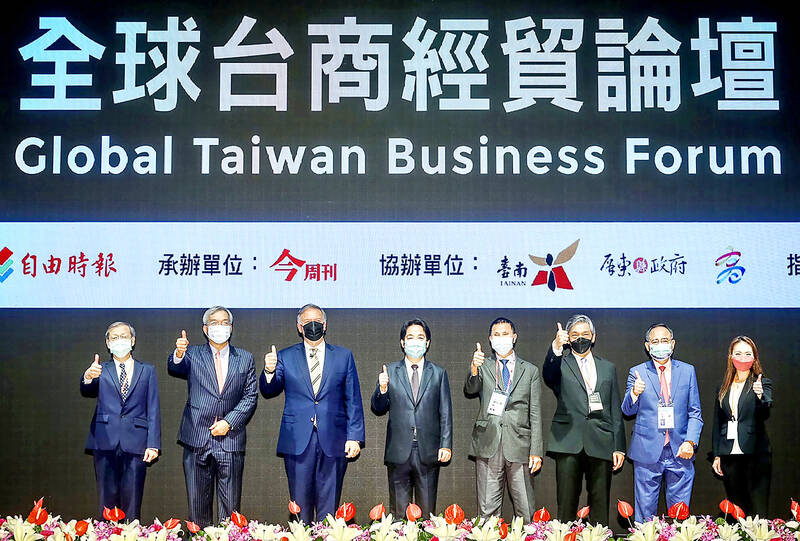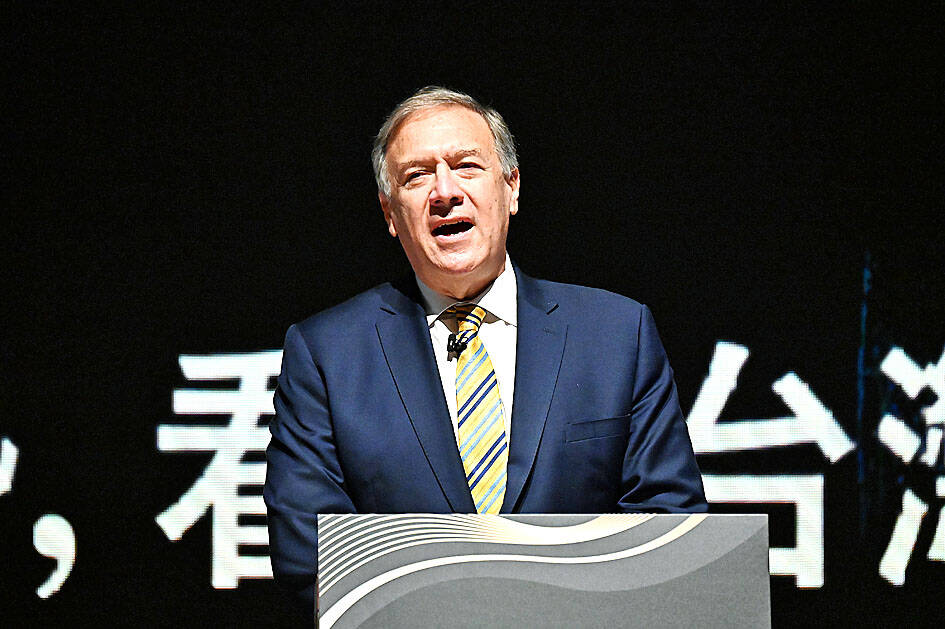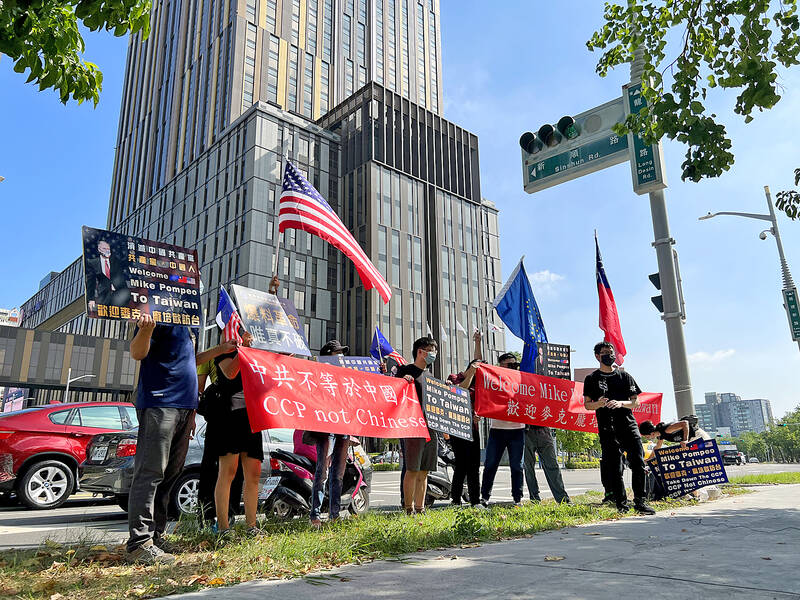The economic “status quo,” which benefits China, is changing, presenting opportunities for closer cooperation between Taiwan and the US, former US secretary of state Mike Pompeo told a business forum in Kaohsiung yesterday.
Pompeo is visiting Taiwan for the second time this year to attend the Global Taiwan Business Forum, organized by the Liberty Times (sister paper of the Taipei Times).
In a speech before more than 300 business representatives at the Kaohsiung Marriott Hotel, Pompeo discussed shifting relations in Southeast Asia driven by aggressive Chinese conduct.

Photo: CNA
Beijing’s actions have changed the region and “brought those who prefer peace and commerce even more closely together,” he said.
Pompeo said that as secretary of state he and his department grappled with some fundamental questions about long-standing US policy toward China.
“America must admit a hard truth, a truth that should guide us in the years and decades ahead,” he said. “If we want a free 21st century and not a Chinese century, the century which [Chinese President] Xi Jinping [習近平] dreams of, the old paradigm of blind engagement must end.”

Photo: Lee Hui-chou, Taipei Times
The US must instead engage with China “realistically and on our terms,” which would include a “deep and far more enthusiastic relationship” with Taiwan, he said.
This relationship includes security, but also the trade and economic ties on which a security relationship can be built, he said, touting tariffs and export controls on Chinese goods put in place under former US president Donald Trump.
“The result is not a decoupling from China by the United States and Taiwan, but a turning point,” he said.

Photo: Kayleigh Madjar, Taipei Times
“There was nothing free nor fair” about the US-China trade relationship, nor is free trade even possible with a country that does not respect the basic rule of law, human rights or intellectual property, he said.
“The good news here today is that Taiwan is completely different. It is the opposite of China in every one of those respects,” he said, praising Taiwan as a global model for free trade.
While the possibility of a trade agreement between the two nations has received a lot of attention, it was only innovative when first proposed in the 1970s, considering today’s de facto reality, he said.
The private sector is where things happen more quickly, he added.
“Politics is often an awful lot of talk with too little action,” he said. “It is the level of business ... where good things happen first and most often, and great minds meet.”
To facilitate their work, Pompeo called for tangible steps to make it easier to do cross-national business, such as streamlining access to business licenses, making it easier to incorporate in Taiwan and using the same credit ratings.
“I see here in Taiwan a young and incredibly aggressive, innovative people. I see the rule of law and free markets flourishing, I see a government that is focused on common sense and infrastructure,” he said. “These are just a couple of reasons that I am optimistic this morning that it is in the best interests of the United States and Taiwan to work together.”
Although he did not repeat a call he made during his visit in March for Washington to officially recognize Taiwan, he did emphasize the “reality” of Taiwan’s independence.
“Taiwan does not need to declare its independence, because it is already an independent nation,” he said. “I promise you that the people of the United States and our government will recognize this simple political, diplomatic and sovereign reality.”
He also accused US President Joe Biden of making US policy on Taiwan “more ambiguous” with his “muddled and confusing statements,” likely referring to the four separate occasions that Biden has confirmed a US commitment to militarily defend Taiwan, followed by White House statements clarifying that US policy had not changed.
As for Biden’s Indo-Pacific Economic Framework, Pompeo said it was unclear what it would achieve other than “diplomatic talk and coffee and salons,” although it was wrong to withhold an invitation to Taiwan “for political reasons.”
Pompeo today is to deliver an opening address at the annual meeting of the World Taiwanese Chambers of Commerce and meet with executives of high-tech companies.
While his visit to Taipei in March was focused on politics, Pompeo said he was excited to spend some time in the south and speak with business representatives.

PREPAREDNESS: Given the difficulty of importing ammunition during wartime, the Ministry of National Defense said it would prioritize ‘coproduction’ partnerships A newly formed unit of the Marine Corps tasked with land-based security operations has recently replaced its aging, domestically produced rifles with more advanced, US-made M4A1 rifles, a source said yesterday. The unnamed source familiar with the matter said the First Security Battalion of the Marine Corps’ Air Defense and Base Guard Group has replaced its older T65K2 rifles, which have been in service since the late 1980s, with the newly received M4A1s. The source did not say exactly when the upgrade took place or how many M4A1s were issued to the battalion. The confirmation came after Chinese-language media reported

A Ministry of Foreign Affairs official yesterday said that a delegation that visited China for an APEC meeting did not receive any kind of treatment that downgraded Taiwan’s sovereignty. Department of International Organizations Director-General Jonathan Sun (孫儉元) said that he and a group of ministry officials visited Shenzhen, China, to attend the APEC Informal Senior Officials’ Meeting last month. The trip went “smoothly and safely” for all Taiwanese delegates, as the Chinese side arranged the trip in accordance with long-standing practices, Sun said at the ministry’s weekly briefing. The Taiwanese group did not encounter any political suppression, he said. Sun made the remarks when

The Taiwanese passport ranked 33rd in a global listing of passports by convenience this month, rising three places from last month’s ranking, but matching its position in January last year. The Henley Passport Index, an international ranking of passports by the number of designations its holder can travel to without a visa, showed that the Taiwan passport enables holders to travel to 139 countries and territories without a visa. Singapore’s passport was ranked the most powerful with visa-free access to 192 destinations out of 227, according to the index published on Tuesday by UK-based migration investment consultancy firm Henley and Partners. Japan’s and

BROAD AGREEMENT: The two are nearing a trade deal to reduce Taiwan’s tariff to 15% and a commitment for TSMC to build five more fabs, a ‘New York Times’ report said Taiwan and the US have reached a broad consensus on a trade deal, the Executive Yuan’s Office of Trade Negotiations said yesterday, after a report said that Washington is set to reduce Taiwan’s tariff rate to 15 percent. The New York Times on Monday reported that the two nations are nearing a trade deal to reduce Taiwan’s tariff rate to 15 percent and commit Taiwan Semiconductor Manufacturing Co (TSMC, 台積電) to building at least five more facilities in the US. “The agreement, which has been under negotiation for months, is being legally scrubbed and could be announced this month,” the paper said,